- Home
- John Bellairs
Eyes of the Killer Robot Page 8
Eyes of the Killer Robot Read online
Page 8
Johnny only heard about half of what the old man was saying. His body felt numb, and his mind kept drifting off into a dreamy world where nothing mattered at all. He was terribly frightened, but when he tried to speak, his lips wouldn't move. Meanwhile, the old man tugged at his collar, and Johnny's limp body bumped over the rough ground. The old man was whistling softly, but just as Johnny was wondering what tune it was, he blacked out again.
Later, Johnny awoke. He was lying on a hard surface, and everything around him looked blurry. Where were his glasses? The old man must have taken them off, or maybe they had fallen off when he was being dragged across the ground. Where was he now? Vague shapes swam before his eyes. Then he heard someone cough, and he saw shadowy hands moving near him. The old man was slipping Johnny's glasses onto his head, and now he was propping him up so he could see. Warily, Johnny looked around: he was in a room with rough stone walls, and he was lying on a table. Near him, on a marble-topped washstand, glittering instruments—a scalpel, a probe—lay in a row. Next to the instruments lay a small hand mirror, and nearby stood a large glass jar that was half full of dark green moss. Against one wall of the room an old oak sideboard loomed, and three oil lamps burned on top of it. Near the lamps stood a bronze incense burner, and bluish smoke curled up from the holes in its lid. At the far end of the room stood something large—a statue, maybe—that was draped with a painter's drop cloth. The old man started to speak.
"So here we are. Isn't this a nice place?" he crooned in a threatening voice. "I hope you're comfortable, but if you aren't, I'm afraid there's not much you can do about it. The drug that I put in your coffee will keep you paralyzed for quite some time. Unfortunately, it doesn't keep you from feeling pain, but then, we can't have everything, can we? Now before we begin, I wonder if you'd care to see my new creation. I'll have to wait forty days before it can be used, but I'm a patient man. Alas, this will be your only chance to see it, so make the most of your opportunity. Are you ready?"
Johnny's head was lowered back onto the hard table, and he heard footsteps moving down to the other end of the room. There was a swishing sound, and then the footsteps returned. The old man propped Johnny's head up again, and he saw the thing that had been hidden by the drop cloth. His heart began to hammer hard, and a soundless scream burst inside his head. There on a stone pedestal stood a gaunt figure made of shining metal. It was shaped to look like a shriveled corpse with spindly arms and legs. The head was like a skull covered with glittering skin, and the large hollow eye sockets were empty.
CHAPTER ELEVEN
Once again, the maroon Pontiac was bumping along the rutty road that led up the side of Mount Creed. The professor gripped the steering wheel hard, and he cursed every time the car hit a bump. Fergie sat beside him, and the look on his face showed that he was frightened but determined. They were going much too fast on this winding road, and sometimes the car skidded very close to the edge when the professor rounded a curve. But Fergie didn't complain—he knew they were in a desperate hurry, and he only hoped that they were going in the right direction. After they had careened round a tight hairpin turn, the professor began to slow down. Up ahead of them a car was parked in the middle of the road.
"Hah!" said the professor as he put on the brakes and turned off the engine. "I'll bet you that's old Sloane's car. Who else would be up on this godforsaken mountain at this time of night? Well, that proves that we've come to the right place. And in case there was any doubt in your mind, it also proves that Sloane is no ghost—ghosts don't need cars to take them from one place to the next. All right! Everybody out! We're going the rest of the way on foot!"
Fergie and the professor got out, and they edged past the old rusty Chevrolet, moving quickly. The clouds had cleared and the moon was out, and this helped them see where they were going. The road had stopped winding, and climbed straight up the side of the mountain. Dark masses of bushes and trees loomed on both sides.
"I... I wish I had brought a weapon of... some kind," the professor gasped as he paused to catch his breath. "The jack handle—we might have been able to use it."
"It's a heck of a time to be thinkin' about that," grumbled Fergie as he wiped his forehead with his sleeve. "By the way, do you think we're gettin' close? It's hard to tell in the dark."
The professor squinted into the gloom. "I can't be positively sure, but I think the house is around that curve up there—you see it, way up ahead?"
Fergie nodded. "I guess so. Okay, I've got my wind back, so let's get movin'. You all right?"
The professor grinned. "Except for nervous prostration, exhaustion, and a fierce ache in my side, I'm in great shape!" he said. "Forward, at the gallop!"
Fergie and the professor started to run. They both had the feeling that something awful was going to happen to Johnny, and they wanted to get to the house as fast as they possibly could. As they drew closer to the curve in the road, they saw that the professor had been right: there was the grassy field glimmering in the moonlight, and in the distance the shadowy house waited. But there was something standing in the field, near the edge of the road. A post? No. It was someone with a rifle in his hands.
Fergie and the professor stopped running. Cold fear swept over them, and they glanced quickly at each other. With crunching sounds, the figure moved closer, and now they could see that it was a teenager, a boy who was maybe fifteen years old. He had a pimply face and a crew cut, and he looked mean.
"Okay, you two!" he yelled. "That's as far as you go! Back off!"
The professor clenched his fists. He could feel anger welling up inside him. With an effort, he managed to keep calm. "Young man," he said in a strained voice, "you must have a lot of spare time on your hands. I mean, here you are, with a gun in your hands, guarding a deserted empty house. May I ask why?"
"House isn't deserted," snapped the boy, and he waved the rifle around to show that he meant business. "It belongs to Mr. Oglesby, an' he pays me t'look after the place. He called me up from his gas station, an' he said fer me t'come up here 'bout ten o'clock an' keep people away. An' I do what he tells me to do. So get movin', er you'll be sorry."
Fergie turned to the professor. "Who's Oglesby?" he whispered.
"That must be the name Sloane is using," the professor muttered. And he added nastily, "I'd like to wring that kid's neck! He thinks he's the king of the hill with that wretched piece of artillery in his hands!"
"Huh? What'd you say?" asked the boy in a threatening voice.
"None o' your business," snapped Fergie.
There was silence for about a minute. The boy stood tensely gripping the rifle in his hands, while Fergie and the professor stood several paces away, watching him. Finally Fergie stepped forward. He looked the boy up and down contemptuously, and folded his arms.
"Okay, you!" he said loudly. "Are you really gonna shoot us if we try to get past you? Are you that dumb? You shoot us, an' you'll get tossed in jail fer the rest o' your life! How'd you like fer that to happen? Huh?"
The boy stiffened. "Who're you callin' dumb, you long-nosed goop? You say that to me again, an' I'll push your face in!"
"You an' who else?" said Fergie in a taunting voice. "I bet you couldn't fight yer way out of a paper bag!"
As the professor watched in amazement, the boy threw down his rifle and rushed at Fergie. Swearing, he lunged at Fergie's throat, but Fergie ducked to one side and landed a punch in the boy's stomach. They started rolling around in the grass, kicking and snarling. Quickly the professor sprang forward. He picked up the rifle, slid the bolt back, and dumped the bullet out. Then he threw the rifle down and tried to break up the fight. The pimply-faced kid had a cut lip and some red marks on his face.
"Had enough?" snarled Fergie. He raised his right fist in the air threateningly.
"All right, you two!" barked the professor. "The fight's over. There are more important things to be attended to! Break it up!" He bent over and grabbed Fergie by the shoulders, but at that moment something happened. From the underbrush
across the road came a loud crackling and crunching. Boughs swayed and bent, and suddenly a large, man-sized shape lurched out into the middle of the road.
In an instant, the professor guessed. "Oh, my God!" he gasped. "It's the robot!"
Swaying uncertainly, the thing looked around. In the moonlight it was hard to tell, but it looked like a big husky man with a shock of blond hair on his head. The robot had taken on the shape that it had when it struck out Clutch Klemm in the summer of 1900.
"Run, everybody, run!" yelled the professor in a panicky voice. "That thing isn't human, and if it catches you, it'll kill you! For God's sake, let's go! Come on, while we have the chance!"
Nobody needed to be warned a second time. Before the professor had finished speaking, the pimply-faced boy took off on the dead run across the field. Fergie and the professor galloped toward the house, and the crunching sounds they heard behind them made them run even harder. They didn't stop until they were standing on the shadowy front porch of the house.
"Is... is it... coming... after us?" gasped the professor. He was holding his side and wincing with pain.
Fergie looked. The hulking moonlit figure was plodding along at a steady pace through the tall grass. Apparently the robot did not believe in hurrying.
As soon as he had caught his breath, the professor dashed into the house, with Fergie right behind him. The rooms were empty and dark, and there was no sound. Sudden despair filled the professor's heart—had they come to the wrong place? Then, as he was struggling to fight back tears, he heard it. A small sound, a distant clinking and clattering. It seemed to be coming from down below, in the basement.
"Come on!" yelled the professor as he grabbed Fergie's arm. "We've got to find the kitchen! I mean, the cellar door! Follow me!"
They stumbled down a dark hallway, bumping into doors on the way. In the distance, moonlight was shining on a worn linoleum floor, and that guided them. Once they had reached the kitchen, Fergie and the professor began looking wildly around. One door opened into a closet, and another led to the pantry. Where was the door that led to the basement? Then, as he paused in the middle of the room, the professor looked down. A linoleum-covered door lay at his feet. With a yell he dropped to his knees and grabbed the little ring that served as a doorknob. Pulling the heavy door back, the professor peered down into the blackness. He could just barely make out a rickety flight of steps. Carefully he began to pick his way down, and Fergie followed.
The basement smelled musty and damp, and it was absolutely pitch dark—except for one thing. A tiny, pencil-thin line of light could be seen over in one corner. Groping his way forward, the professor found that he was standing in front of a set of wooden shelves that was full of Mason jars. The light was coming from a crack in a wooden door that stood behind the shelves. Furiously the professor hurled jars this way and that, and the basement was filled with the sound of breaking glass. With Fergie's help, he heaved the shelves sideways and kicked open the door.
Fergie and the professor stopped in the doorway, and they stared. Before them lay a rock-walled room that was lit by three oil lamps. On a table lay Johnny, stiff and still and deathly pale, and near him stood the old man from the gas station. He was wearing a white smock and rubber gloves, and in one hand he held a glittering sharp scalpel. The other hand clutched a mirror.
"You dirty dog!" screeched the professor, and he rushed at the man, knocking him backwards across the marble-topped stand. Instruments clattered to the floor, and the glass jar full of moss shattered. The old man fell, but he sprang up nimbly with the scalpel still in his hand. He lunged at the professor, but he missed, and suddenly the professor was on him, hammering at his midsection and yelling all sorts of unpleasant things. The old man crumpled. The professor's foot came down on his wrist, and the scalpel fell from his fingers.
"There!" snarled the professor fiercely. His face was beet red, and he was breathing hard. "You rotten fourteenth-rate excuse for a human being!" he roared. "I'll fix you, by the eternal powers I will!"
The old man lay on the floor, cowering. "Please... please don't kill me," he said in a quavering voice.
The professor glanced down, and then he turned away. Fergie was standing by the table, his hand on Johnny's heart. With fear in his eyes, he looked up.
"He's alive, prof!" said Fergie. "I mean, his heart's beatin', but he's out cold. Whaddaya think that old crud did to him?"
"He probably fainted from sheer terror," snapped the professor. "And he may be drugged. Can you lift him? We'll just have to try to ..."
The professor's voice died away. From the dark basement that lay beyond the doorway came the sound of crunching glass. Heavy footsteps moved closer, and then the robot came lurching into the lamplit room. Its large blue eyes were lit by an evil, insane glow. As soon as he saw the thing, the old man let out a bloodcurdling yell and scrambled to his feet. He stood cowering against the wall, and he covered his face with his hands.
"Oh, my Lord, no!" he sobbed. "No, no! What have you fools done? What have you done?"
CHAPTER TWELVE
A hush fell over the room. Fergie stood watching the robot, with Johnny's head propped up in his hands. The professor's mind was racing—he was trying to remember the name of the thing that you were supposed to use to control the robot. And then it came to him.
"The key!" he exclaimed, turning to the old man. "Sloane, you detestable wretch! Where is the Key of Arbaces? Do you have it?"
Sloane took his hands away from his face. "It... it's in the sideboard behind you. In the top drawer. It—"
Suddenly the robot moved forward. With heavy, dragging steps, it stumped past the table where Johnny lay and reached out its arms to grab Sloane. He shrieked and dodged out of the way, and the robot bumped clumsily against the wall. Meanwhile, the professor was fumbling madly with pot holders and medicine bottles in the top drawer of the sideboard. Finally the professor's fingers closed over a key. It looked like an ordinary house key, and a cardboard tag dangled from it on a string.
"Is this it? Is this the key?" he yelled waving the key in the air.
"Yes! Yes!" Sloane babbled as he moved farther along the wall. "Put it in the hole in the back of his neck and turn it! For God's sake, hurry!"
As Sloane talked, the robot began shuffling along next to the wall like a great oversized toy. Then it took three steps toward Sloane and, with a sweep of its arm, knocked him to his knees. With the key in his hand, the professor began to sneak up behind the robot. He was horribly afraid that the thing would turn on him, but it was not interested in anyone but Evaristus Sloane. Seizing Sloane by the shoulders, the robot picked him up and slammed him against the wall. The professor crept closer, and now he could see a small oblong hole in the creature's neck. It was just above his shirt collar. With a sudden leap, the professor reached up, plunged the key into the hole, and twisted it. The robot stiffened, and its arms fell to its sides. It turned halfway round, and then fell to the floor with a loud metallic clatter. The professor and Fergie looked down, and as they watched, the robot's body shimmered and wavered. The human form melted away, and there lay the shiny aluminum man in his metal baseball uniform.
As the professor was trying to figure out what to do next, Sloane made a dash for the door.
"Hey!" Fergie yelled. "Go after him, prof! Are you gonna let that rat get away?"
"He can run all the way to the St. Lawrence Seaway, for all I care!" growled the professor. "We'd better get Johnny back to the car. Maybe we can find a doctor in Stark Corners who will be willing to look him over. Let's get a move on!"
Quickly the professor glanced at the corpselike metal statue that stood in a corner of the room. He shuddered, and then he moved to the end of the table and lifted Johnny's legs. Fergie put his hands under Johnny's armpits, and together they carried him out of the room and across the dark basement. As they maneuvered Johnny up the cellar steps, the professor half expected to see Evaristus Sloane waiting for them with a pistol or an axe in his han
ds. Fortunately, though, he wasn't there, and they went on their way with Johnny's limp body, out the back door of the house and across the field toward the road. Johnny began to groan and make muffled noises. He tossed his head like somebody having a bad dream.
"Thank God!" breathed the professor. "The way he looked, I thought he was three quarters of the way toward death. Hang on, my boy—hang on! We're going to get help for you as soon as we can!"
A little while later, the professor and Fergie were sitting in the waiting room of a doctor's office. They had taken Johnny to the first doctor they could find, a Dr. Smethers who lived in a large Victorian house on the main street of Stark Corners. The doctor had been a bit annoyed when Fergie and the professor banged on his door late at night, but as soon as he saw that there was a real emergency, he got to work. He had been examining Johnny for a long time, and Fergie and the professor were starting to get impatient. The longer they waited, the more they worried about Johnny. Maybe he was dying, and the doctor was afraid to tell them. Whatever the situation was, they wanted to know about it.
Finally Dr. Smethers opened the door. He was a very distinguished-looking man with a gray mustache and curly hair.
"Well?" said the professor as he jumped up out of his seat.
The doctor smiled reassuringly. "Relax," he said. "Your friend is going to be all right. He was given some drug that I don't know the name of—a muscle-relaxing drug like curare. At any rate, he didn't get a big dose, and the effects are starting to wear off. What on earth happened to the poor boy?"
The professor looked the doctor straight in the eye. He tried hard to seem sincere and honest. "He was grabbed by a madman who had set up some sort of insane laboratory in the basement of an old stone house up on Mount Creed. We were camped near there, and we managed to get Johnny away from this character. But he may still be up there. Will you call the police to the house to see if they can nab him?"

 The Curse of the Blue Figurine
The Curse of the Blue Figurine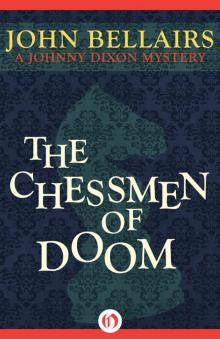 Chessmen of Doom
Chessmen of Doom Secret of the Underground Room
Secret of the Underground Room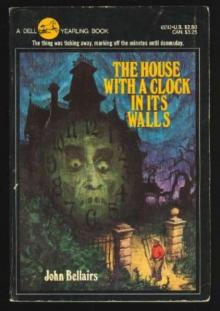 The House With a Clock in Its Walls
The House With a Clock in Its Walls The Vengeance of the Witch-Finder
The Vengeance of the Witch-Finder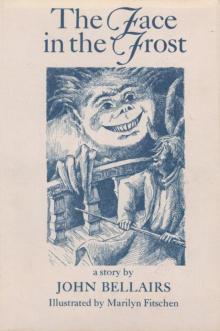 The Face in the Frost
The Face in the Frost Revenge of the Wizard's Ghost
Revenge of the Wizard's Ghost Spell of the Sorcerer's Skull
Spell of the Sorcerer's Skull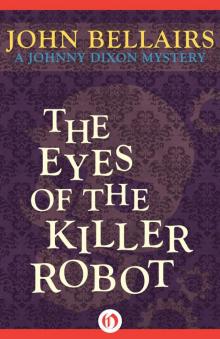 Eyes of the Killer Robot
Eyes of the Killer Robot Mummy, the Will, and the Crypt
Mummy, the Will, and the Crypt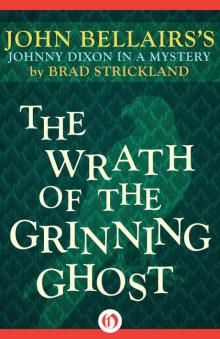 Wrath of the Grinning Ghost
Wrath of the Grinning Ghost The Mansion in the Mist
The Mansion in the Mist The Doom of the Haunted Opera
The Doom of the Haunted Opera The Bell, the Book, and the Spellbinder
The Bell, the Book, and the Spellbinder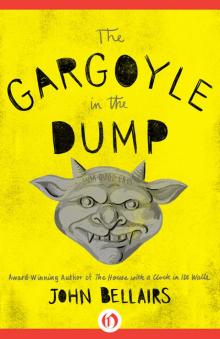 The Gargoyle in the Dump
The Gargoyle in the Dump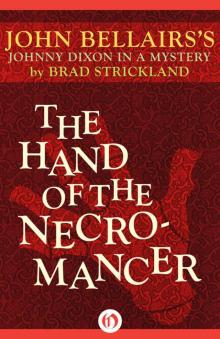 The Hand of the Necromancer
The Hand of the Necromancer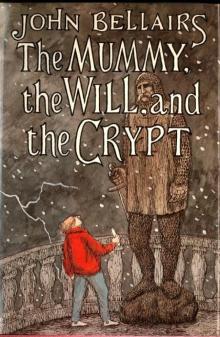 The Mummy, the Will, and the Crypt
The Mummy, the Will, and the Crypt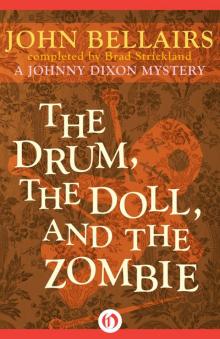 Drum, the Doll, and the Zombie
Drum, the Doll, and the Zombie The Specter from the Magician's Museum
The Specter from the Magician's Museum The Letter, the Witch, and the Ring
The Letter, the Witch, and the Ring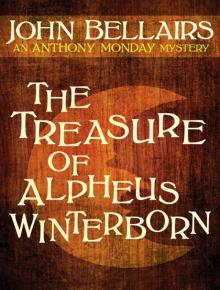 The Treasure of Alpheus Winterborn
The Treasure of Alpheus Winterborn The Dark Secret of Weatherend
The Dark Secret of Weatherend The Figure in the Shadows
The Figure in the Shadows